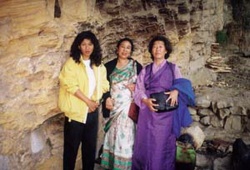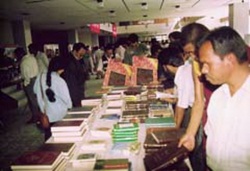Difference between revisions of "Tibetan Bookstores in Nepal As I See Them"
| (One intermediate revision by one other user not shown) | |||
| Line 1: | Line 1: | ||
[[File:009.jpg|thumb|250px|]] | [[File:009.jpg|thumb|250px|]] | ||
| − | It was a fine day in Kathmandu when I walked along the major streets of the capital of Nepal. Unlike my friends, who went shopping or sightseeing, I was looking for Tibetan language bookstores. Before I set foot on the Nepalese soil, my friends at the Sino-Nepalese border told me: "One fully loaded Nepalese truck coming from Lhasa tumbled at the Zam Port, and what fell out was nothing but newly published Tibetan language books!" My friends with the Tibet People's Publishing House revealed that there were people who waited for new books to be printed and shipped to Nepal and India. This understanding impelled me to search for Tibetan language bookstores in Kathmandu. I found a number of such stores stocked with Tibetan language books published by the publishers in Tibet as well as in Qinghai, Gansu, Sichuan and Yunnan. They were all of good quality in every way. In a bookstore in Kathmandu, I took one book off the shelf and found it was published overseas. Leafing through, I found some mistakes in it. I showed the mistakes to the owner and the news quickly spread. The local international language school invited me to read test papers for them. | + | It was a fine day in {{Wiki|Kathmandu}} when I walked along the major streets of the {{Wiki|capital}} of [[Nepal]]. Unlike my friends, who went shopping or sightseeing, I was looking for [[Tibetan language]] bookstores. Before I set foot on the {{Wiki|Nepalese}} soil, my friends at the Sino-Nepalese border told me: "One fully loaded {{Wiki|Nepalese}} truck coming from {{Wiki|Lhasa}} tumbled at the Zam Port, and what fell out was [[nothing]] but newly published [[Tibetan language]] [[books]]!" My friends with the [[Tibet]] People's Publishing House revealed that there were [[people]] who waited for new [[books]] to be printed and shipped to [[Nepal]] and [[India]]. This [[understanding]] impelled me to search for [[Tibetan language]] bookstores in {{Wiki|Kathmandu}}. I found a number of such stores stocked with [[Tibetan language]] [[books]] published by the publishers in [[Tibet]] as well as in {{Wiki|Qinghai}}, [[wikipedia:Gansu|Gansu]], {{Wiki|Sichuan}} and Yunnan. They were all of good quality in every way. In a bookstore in {{Wiki|Kathmandu}}, I took one [[book]] off the shelf and found it was published overseas. Leafing through, I found some mistakes in it. I showed the mistakes to the [[owner]] and the news quickly spread. The local international [[language]] school invited me to read test papers for them. |
[[File:010as.jpg|thumb|250px|]] | [[File:010as.jpg|thumb|250px|]] | ||
| − | Around October 1 that year, China held a book exhibition in Kathmandu. I witnessed the fact that there were so many Nepalese friends who vied to buy books published in China. Many of them bought whole box-loads. A Tibetan lama bought the rest. During the exhibition, I came across a young man of the Sharba ethnic group. He later visited my residence four times to insist I teach him Tibetan. Moved by his steadfast desire, I did so free of charge for a year until I was transferred back to Tibet. Except for books published in China, which were well received, beautifully painted and printed calendars sold like hot cakes. This is because a dozen ethnic groups residing in Nepal adopt the Tibetan calendar. In Nepal, there are many monasteries of Tibetan Buddhism. They take pride in obtaining Gangyur and Dangyur published in China. "They are authentic!" some lamas there told me. Once I dropped in on a Tibetan monastery flanking a major street, I found there were lamas busily engaged in some activity in the main hall. They told me they had purchased copies of Gangyur and Dangyur from Lhasa, adding: "They are the most auspicious objects in our monastery." | + | Around October 1 that year, [[China]] held a [[book]] exhibition in {{Wiki|Kathmandu}}. I witnessed the fact that there were so many {{Wiki|Nepalese}} friends who vied to buy [[books]] published in [[China]]. Many of them bought whole box-loads. A [[Tibetan]] [[lama]] bought the [[rest]]. During the exhibition, I came across a young man of the Sharba {{Wiki|ethnic}} group. He later visited my residence four times to insist I teach him [[Tibetan]]. Moved by his steadfast [[desire]], I did so free of charge for a year until I was transferred back to [[Tibet]]. Except for [[books]] published in [[China]], which were well received, beautifully painted and printed calendars sold like [[hot]] cakes. This is because a dozen {{Wiki|ethnic}} groups residing in [[Nepal]] adopt the [[Tibetan calendar]]. In [[Nepal]], there are many [[monasteries]] of [[Tibetan Buddhism]]. They take {{Wiki|pride}} in obtaining Gangyur and Dangyur published in [[China]]. "They are [[Wikipedia:Authenticity|authentic]]!" some [[lamas]] there told me. Once I dropped in on a [[Tibetan]] [[monastery]] flanking a major street, I found there were [[lamas]] busily engaged in some [[activity]] in the main hall. They told me they had purchased copies of Gangyur and Dangyur from {{Wiki|Lhasa}}, adding: "They are the most [[auspicious]] [[objects]] in our [[monastery]]." |
{{R}} | {{R}} | ||
[http://zt.tibet.cn/tibetzt/tibet50-en/talk/talk_011.htm zt.tibet.cn] | [http://zt.tibet.cn/tibetzt/tibet50-en/talk/talk_011.htm zt.tibet.cn] | ||
[[Category:Buddhist Terms]] | [[Category:Buddhist Terms]] | ||
| − | + | ||
[[Category:Tibetan Buddhist History]] | [[Category:Tibetan Buddhist History]] | ||
Latest revision as of 03:33, 30 September 2013
It was a fine day in Kathmandu when I walked along the major streets of the capital of Nepal. Unlike my friends, who went shopping or sightseeing, I was looking for Tibetan language bookstores. Before I set foot on the Nepalese soil, my friends at the Sino-Nepalese border told me: "One fully loaded Nepalese truck coming from Lhasa tumbled at the Zam Port, and what fell out was nothing but newly published Tibetan language books!" My friends with the Tibet People's Publishing House revealed that there were people who waited for new books to be printed and shipped to Nepal and India. This understanding impelled me to search for Tibetan language bookstores in Kathmandu. I found a number of such stores stocked with Tibetan language books published by the publishers in Tibet as well as in Qinghai, Gansu, Sichuan and Yunnan. They were all of good quality in every way. In a bookstore in Kathmandu, I took one book off the shelf and found it was published overseas. Leafing through, I found some mistakes in it. I showed the mistakes to the owner and the news quickly spread. The local international language school invited me to read test papers for them.
Around October 1 that year, China held a book exhibition in Kathmandu. I witnessed the fact that there were so many Nepalese friends who vied to buy books published in China. Many of them bought whole box-loads. A Tibetan lama bought the rest. During the exhibition, I came across a young man of the Sharba ethnic group. He later visited my residence four times to insist I teach him Tibetan. Moved by his steadfast desire, I did so free of charge for a year until I was transferred back to Tibet. Except for books published in China, which were well received, beautifully painted and printed calendars sold like hot cakes. This is because a dozen ethnic groups residing in Nepal adopt the Tibetan calendar. In Nepal, there are many monasteries of Tibetan Buddhism. They take pride in obtaining Gangyur and Dangyur published in China. "They are authentic!" some lamas there told me. Once I dropped in on a Tibetan monastery flanking a major street, I found there were lamas busily engaged in some activity in the main hall. They told me they had purchased copies of Gangyur and Dangyur from Lhasa, adding: "They are the most auspicious objects in our monastery."

